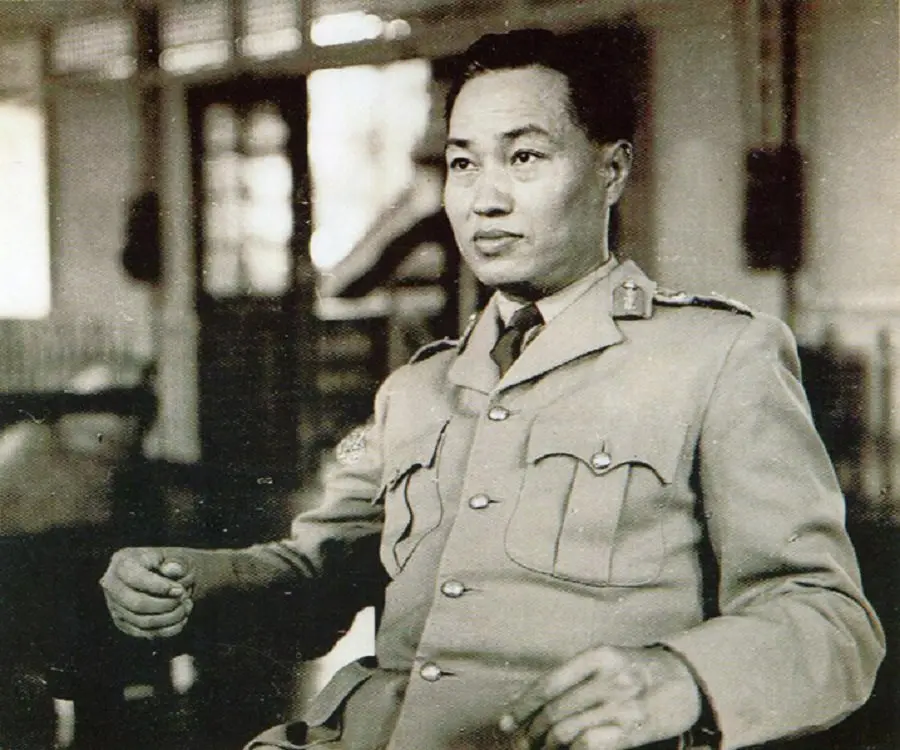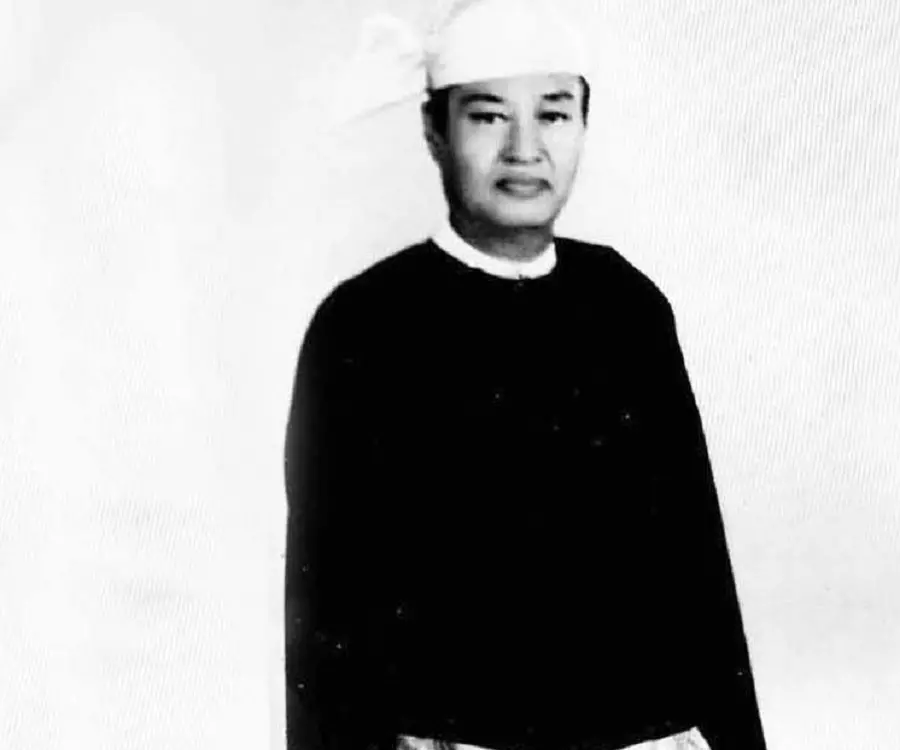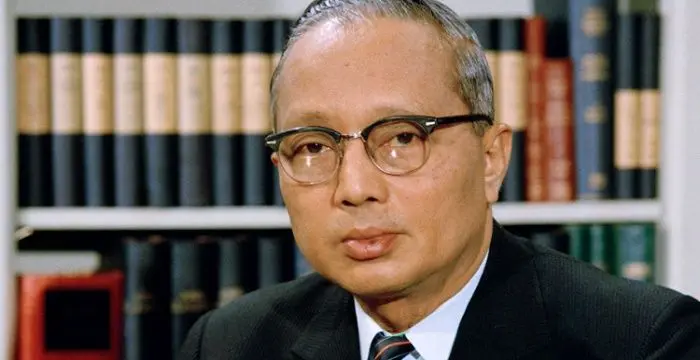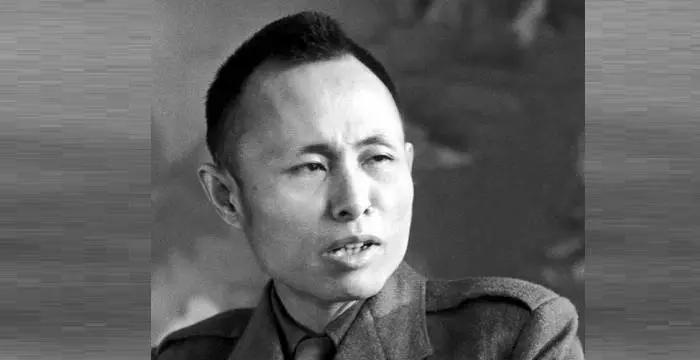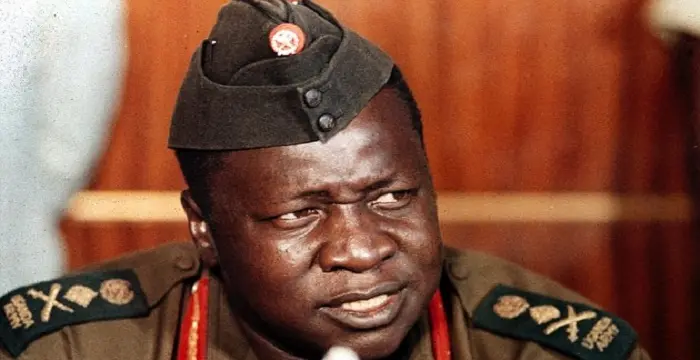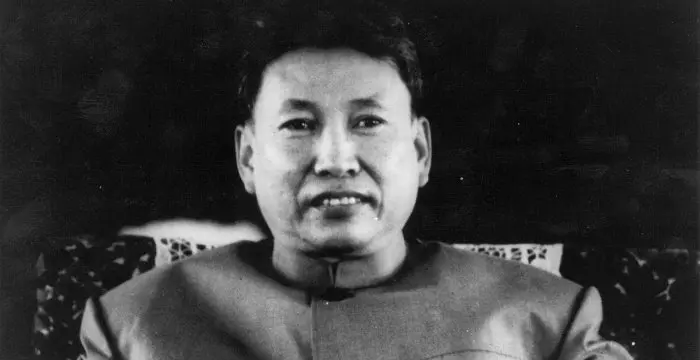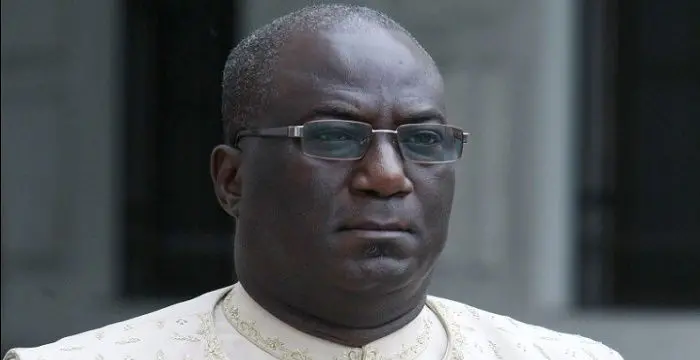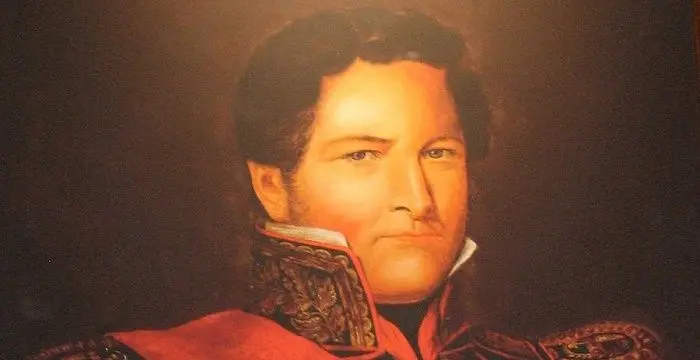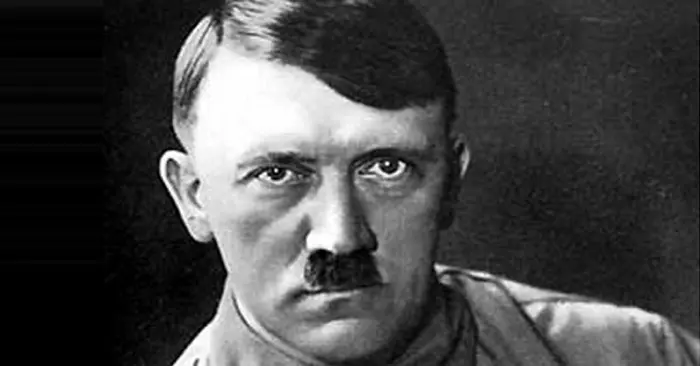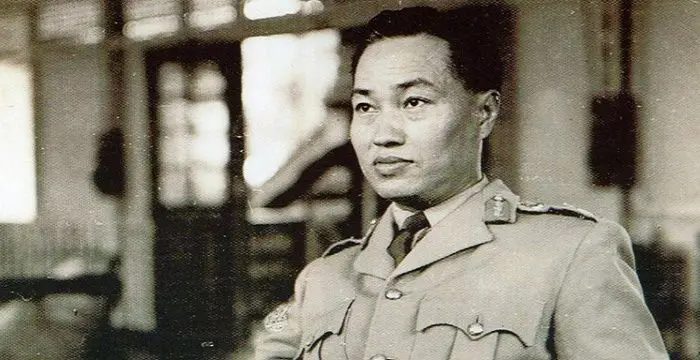
Ne Win - Burmese Leaders, Timeline and Childhood
Ne Win's Personal Details
Ne Win is a politician from Burma, who is known for having practiced military law in his country for more than 26 years
| Information | Detail |
|---|---|
| Birthday | May 14, 1911 |
| Died on | December 5, 2002 |
| Nationality | Burmese |
| Famous | Leaders, Dictators, Burmese Leaders, Burmese Politician |
| Spouses | Daw Khin May Than, Daw Ni Ni Myint, Daw Than Nyunt, Daw Tin Tin, June Rose Bellamy |
| Known as | Shu Maung |
| Childrens | Aye Aung, Kyaw Thein, Kyemon Win, Ngwe Soe, Phyo Wai Win, Sandar Win |
| Universities |
|
| Founder / Co-Founder |
|
| Birth Place | Paungdale |
| Political Ideology | Political party-Burma Socialist Programme Party |
| Religion | Theravada |
| Gender | Male |
| Sun Sign | Taurus |
| Born in | Paungdale |
| Famous as | Burmese Politician |
| Died at Age | 91 |
Ne Win's photo
Who is Ne Win?
Ne Win was a politician and military officer in Burma, who began his political career as a member of an organization called 'Dobama Asiayone'. He later went on to jointly form ‘Burma Independence Army’, along with his comrades. He soon started leading the Burmese army, and at the age of forty-eight, this leader became the second Prime Minister of Burma. Though his term lasted only two years, political ambition drove this general to lead a military uprising against the prevalent government. He was successful in his attempt, and introduced martial law in Burma, ruling the country as a dictator for nineteen years. During this time he introduced a few reforms that took care of peasant rights, illiteracy and medical care. However, most of his reign was marked by economic crisis, social discrimination and political upheaval. His policies against foreign trade, people of foreign nationalities, and the introduction of new currency regulations were not accepted by most citizens, leading to several cases of mutiny. In 1981, he gave up his office and appointed General San Yu as the president, but continued to exercise control over the military for the next seven years. When his son-in-law conspired against the ruling government, this former ruler was put under house arrest, and eventually lost all his power
// Famous Burmese Leaders
U Thant
U Thant was a Burmese diplomat who served as the Secretary-General of the United Nations. Check out this biography to know about his childhood, life, achievements, works & timeline.
General Aung San
General Aung San was a renowned nationalist leader of Burma. This biography of Aung San provides detailed information about his childhood, life & timeline.
Childhood & Early Life
Ne Win was born as Shu Maung, in the village of Paungdale, Burma in 1910, according to a Burmese book 'The Thirty Comrades' by writer Kyaw Nyein. However, as per other sources like author Dr. Maung Maung's book 'Burma and General Ne Win', the Burmese Prime Minister was born the following year.
In 1929, the young boy started attending 'Rangoon University', with a specialization in Biology. After two years, he was forced to quit college after failing to pass a test.
He soon joined the 'Dobama Asiayone', an organization that sought Burman supremacy as a country. In 1941, Shu Maung and 29 other young men were selected for military training.
Under the umbrella of the organization, Shu formed the ‘Burma Independence Army’, along with revolutionary Aung San, after which he chose a new name for himself—Bo Ne Win.
In 1949, he became the ‘Chief of Staff of the Armed Forces’, and brought about several changes in the structure of the army.
Career
In 1958, the military general succeeded Burmese leader, U Nu as the Prime Minister of Burma, but stepped down two years later, after U Nu won back his position.
Ne Win was involved in a military coup which overthrew the Burmese government on March 2, 1962. The military leader took over the country's power, and dismissed the legislature as well as the constitution, stating that "parliamentary democracy was not suitable for Burma".
General Win established the 'Union Revolutionary Council' as the highest governing body in Burma, and declared himself the Prime Minister. The deposition was hailed by global media as "bloodless", despite the destruction and firing that took place at the 'Student Union Building' of 'Rangoon University'.
On July 13, the same year the Burmese general travelled to the United Kingdom, Austria and Switzerland, claiming that he needed to visit doctors.
In 1963 he declared that 50 and 100 Burmese Kyat notes had become redundant and would no longer be accepted. This caused many families to lose all their savings in a matter of one night. The Kayan tribe of Burma considered this an unfair rule, and revolted against Win's government.
The same year, in February, he introduced the 'Enterprise Nationalization Law', which did not allow new industries to come up and turned all existing industries into government enterprises. This law also restricted Chinese and other foreigners from practising business in Burma, causing many inhabitants to relocate to other countries.
In 1964, the Prime Minister formed the sole legal political party, called the 'Burma Socialist Programme Party' ('BSPP'). The new regime inculcated principles of Marxism, Buddhism, as well as staunch nationalism, and Ne called this the 'Burmese Way to Socialism'.
During this period, special attention was given to medical facilities, as government hospitals were built to provide free health care. In 1965, measures were taken to tackle the issue of illiteracy, particularly among the poor, and laws doing away with land rent empowering the farmers were introduced.
The Burmese economy was isolated from other countries, and international trade was not allowed. This led to smuggled goods flourishing in the market and an unprecedented rise in their prices. The government was reduced to penury, and the living conditions of the masses continued to deteriorate.
Even though a Chinese himself, Ne Win ensured that situations were made unbearable for people from China. In 1967, the scenario became intolerable with Chinese schools and their students being burnt, shops being raided, and riots taking place.
On 2 March 1974, the Burmese leader dissolved the Revolutionary Council and declared Burma a 'Socialist Republic' country. He appointed himself as the President, and elected Brigadier General Sein Win as his Prime Minister.
The same year in June, several factory workers and students mutinied against the oppressive rule of the government, at Rangoon's 'Thamaing Textile Factory' and 'Sinmalaik Dock Yard'. Ne Win was travelling to Australia, but many of the demonstrators were shot at the two venues.
The oppressive leader resigned from his post of Burmese president on November 9, 1981, and General San Yu became the next President. However, this was a tactical move on General Ne’s part since he continued to be the chairman of his political party, and thus was still the sole authority in the country.
In 1982, the Burmese dictator passed the 'Citizenship Law', which refused to grant the same to the Burmese Chinese population. The discrimination spread to such an extent that the Chinese were denied admission into institutions that taught respectable subjects like engineering, medicine, and economics.
In 1987, the Burmese economy faced another crisis when Ne acted on his astrologer’s advice and issued currency of denominations 45 and 90 (both multiples of 9). The earlier currencies were declared illegal, and people had to forego their hard-earned savings.
On July 23, 1988, the political leader resigned from the party, in the face of increasing protests. The next two months saw the occurrence of two major revolts against the 'Burma Socialist Programme Party' and came to be popularly known as the 'Four Eights Uprising'.
Till 1998, even though the political leader was no longer in power, he continued to influence the military-ruled nation.
In 2002, Aye Zaw Win, the Burmese dictator's son-in-law, was found guilty of plotting to subvert the government. As a result, Aye Zaw was given a death sentence, while Ne Win and his daughter Sandar Win were kept under home detention.
Major Works
General Ne Win initially served as interim Prime Minister, but catapulted to power after organizing a coup in 1963 and overturning the existing government, to take supreme control over the nation.
Though he introduced some reforms for eradicating poverty and illiteracy, his approach to isolate Burma from foreign investments in a bid to give the natives more opportunity back fired, as it led to loss of cash inflow for the Government treasury.
Personal Life & Legacy
The Burmese leader first got married to Daw Than Nyunt, and they had a son Kyaw Thein. Later he married Tin Tin, and the couple had two sons, Aye Aung and Ngwe Soe.
His third marriage was with Khin May Than, who already had three daughters from a previous wedding. Ne and Khin had three children, Sandar Win, Kye Mon Win, and Phyo Wai Win. The politician adored Khin May, and her death in 1972, was traumatising for the leader.
After Khin May’s death, he married a university professor, Ni Ni Myint, but divorced her to get married to June Rose Bellamy in 1978. The marriage with June did not last for more than five months, and the former President of Burma remarried Ni Ni Myint, his fourth wife.
On December 5, 2002, General Win passed away during home detention, in present Yangon, former capital of Burma. No grand funeral service was held and later, his daughter Sandar Win scattered his remains into the Yangon River.
Two books have been written about this infamous dictator—‘Burma and General Ne Win’, by Dr Maung Maung and ‘The Thirty Comrades’ by Kyaw Nyein.
Trivia
This Burmese President was a strong believer in numerology and occult practices, who would regularly follow the advice of his fortune-teller. He was known to have stood in front of a mirror, stamping on a piece of meat and shooting his own reflection, to ward off any chances of being assassinated
// Famous Leaders
Edi Rama
Edi Rama is the current Prime Minister of Albania. Check out this biography to know about his childhood, life, achievements, works & timeline.
Tecumseh
Tecumseh was a Native American leader of the Shawnee clan. This biography profiles his childhood, life and timeline.
Khalifa bin Zayed Al Nahyan
Sheikh Khalifa bin Zayed Al Nahyan is the current President of the United Arab Emirates (UAE). Check out this biography to know about his birthday, childhood, family life, achievements and fun facts about him.
Ne Win biography timelines
- // 1910Ne Win was born as Shu Maung, in the village of Paungdale, Burma in 1910, according to a Burmese book 'The Thirty Comrades' by writer Kyaw Nyein. However, as per other sources like author Dr. Maung Maung's book 'Burma and General Ne Win', the Burmese Prime Minister was born the following year.
- // 1929In 1929, the young boy started attending 'Rangoon University', with a specialization in Biology. After two years, he was forced to quit college after failing to pass a test.
- // 1941He soon joined the 'Dobama Asiayone', an organization that sought Burman supremacy as a country. In 1941, Shu Maung and 29 other young men were selected for military training.
- // 1949In 1949, he became the ‘Chief of Staff of the Armed Forces’, and brought about several changes in the structure of the army.
- // 1958In 1958, the military general succeeded Burmese leader, U Nu as the Prime Minister of Burma, but stepped down two years later, after U Nu won back his position.
- // 2nd Mar 1962Ne Win was involved in a military coup which overthrew the Burmese government on March 2, 1962. The military leader took over the country's power, and dismissed the legislature as well as the constitution, stating that "parliamentary democracy was not suitable for Burma".
- // 1963In 1963 he declared that 50 and 100 Burmese Kyat notes had become redundant and would no longer be accepted. This caused many families to lose all their savings in a matter of one night. The Kayan tribe of Burma considered this an unfair rule, and revolted against Win's government.
- // 1963General Ne Win initially served as interim Prime Minister, but catapulted to power after organizing a coup in 1963 and overturning the existing government, to take supreme control over the nation.
- // 1964In 1964, the Prime Minister formed the sole legal political party, called the 'Burma Socialist Programme Party' ('BSPP'). The new regime inculcated principles of Marxism, Buddhism, as well as staunch nationalism, and Ne called this the 'Burmese Way to Socialism'.
- // 1965During this period, special attention was given to medical facilities, as government hospitals were built to provide free health care. In 1965, measures were taken to tackle the issue of illiteracy, particularly among the poor, and laws doing away with land rent empowering the farmers were introduced.
- // 1967Even though a Chinese himself, Ne Win ensured that situations were made unbearable for people from China. In 1967, the scenario became intolerable with Chinese schools and their students being burnt, shops being raided, and riots taking place.
- // 1972His third marriage was with Khin May Than, who already had three daughters from a previous wedding. Ne and Khin had three children, Sandar Win, Kye Mon Win, and Phyo Wai Win. The politician adored Khin May, and her death in 1972, was traumatising for the leader.
- // 2nd Mar 1974On 2 March 1974, the Burmese leader dissolved the Revolutionary Council and declared Burma a 'Socialist Republic' country. He appointed himself as the President, and elected Brigadier General Sein Win as his Prime Minister.
- // 1978After Khin May’s death, he married a university professor, Ni Ni Myint, but divorced her to get married to June Rose Bellamy in 1978. The marriage with June did not last for more than five months, and the former President of Burma remarried Ni Ni Myint, his fourth wife.
- // 9th Nov 1981The oppressive leader resigned from his post of Burmese president on November 9, 1981, and General San Yu became the next President. However, this was a tactical move on General Ne’s part since he continued to be the chairman of his political party, and thus was still the sole authority in the country.
- // 1982In 1982, the Burmese dictator passed the 'Citizenship Law', which refused to grant the same to the Burmese Chinese population. The discrimination spread to such an extent that the Chinese were denied admission into institutions that taught respectable subjects like engineering, medicine, and economics.
- // 1987In 1987, the Burmese economy faced another crisis when Ne acted on his astrologer’s advice and issued currency of denominations 45 and 90 (both multiples of 9). The earlier currencies were declared illegal, and people had to forego their hard-earned savings.
- // 23rd Jul 1988On July 23, 1988, the political leader resigned from the party, in the face of increasing protests. The next two months saw the occurrence of two major revolts against the 'Burma Socialist Programme Party' and came to be popularly known as the 'Four Eights Uprising'.
- // 1998Till 1998, even though the political leader was no longer in power, he continued to influence the military-ruled nation.
- // 2002In 2002, Aye Zaw Win, the Burmese dictator's son-in-law, was found guilty of plotting to subvert the government. As a result, Aye Zaw was given a death sentence, while Ne Win and his daughter Sandar Win were kept under home detention.
- // 5th Dec 2002On December 5, 2002, General Win passed away during home detention, in present Yangon, former capital of Burma. No grand funeral service was held and later, his daughter Sandar Win scattered his remains into the Yangon River.
// Famous Dictators
Idi Amin
A Ugandan dictator, Idi Amin is remembered for his brutal regime and crime against humanity. Check this biography to know in details about his life, childhood, profile and timeline.
Pol Pot
Pol Pot was the Cambodian revolutionary who led the Khmer Rouge. This biography provides a glimpse of his childhood, career, profile and timeline.
Siaka Stevens
Siaka Stevens was the third Prime Minister of Sierra Leone who later became the first President of the country. This biography of Siaka Stevens provides detailed information about his childhood, life, achievements, works & timeline.
Juan Manuel de Rosas
Juan Manuel José Domingo Ortiz de Rosas was an Argentinean dictator. Check out this biography to know about his childhood, life, achievements, works & timeline.
Manuel Noriega
Manuel Noriega was a Panamanian dictator, who ruled Panama as military dictator from 1983 to 1989. This biography profiles his childhood, life, military career, achievements and timeline
Adolf Hitler
Adolf Hitler was the infamous dictator of Germany who carried out the genocide of Jews and was majorly responsible for the World War II. Know more about his life in this biography.
Ne Win's FAQ
What is Ne Win birthday?
Ne Win was born at 1911-05-14
When was Ne Win died?
Ne Win was died at 2002-12-05
Where was Ne Win died?
Ne Win was died in Yangon
Which age was Ne Win died?
Ne Win was died at age 91
Where is Ne Win's birth place?
Ne Win was born in Paungdale
What is Ne Win nationalities?
Ne Win's nationalities is Burmese
Who is Ne Win spouses?
Ne Win's spouses is Daw Khin May Than, Daw Ni Ni Myint, Daw Than Nyunt, Daw Tin Tin, June Rose Bellamy
Who is Ne Win childrens?
Ne Win's childrens is Aye Aung, Kyaw Thein, Kyemon Win, Ngwe Soe, Phyo Wai Win, Sandar Win
What was Ne Win universities?
Ne Win studied at University of Yangon
Which company or organization was founded by Ne Win?
Ne Win was the founder/co-founder of National Unity Party
What is Ne Win's political ideology?
Ne Win's political ideology is Political party-Burma Socialist Programme Party
What is Ne Win's religion?
Ne Win's religion is Theravada
What is Ne Win's sun sign?
Ne Win is Taurus
How famous is Ne Win?
Ne Win is famouse as Burmese Politician
